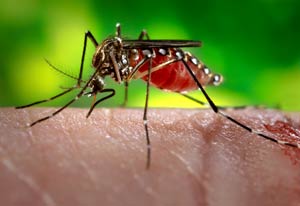Dengue monitored with cell phones
December 2010 | Volume 9, Issue 6
The transmission of mosquito-borne diseases like malaria and dengue can now be tracked using mobile health technology and software. NIH-funded researchers at Colorado State University and the Universidad Autónoma de Yucatán have found a way to gather data on the diseases using cell phones. Vector-borne diseases exact a heavy toll in low-and middle-income countries, slowing economic development. Additionally, the use of paper-based systems for data collection on infectious diseases often hampers the ability of health authorities in developing countries to make informed decisions.
The new mobile health platform, which makes use of the existing communications infrastructure in Mexico, gives dengue researchers near real-time monitoring capacity as well as the ability to rapidly transmit findings. Mosquito control teams equipped with cell phones can visit homes where dengue cases have occurred and immediately send data back from the field or save it to a local database. The resulting information can be used for timely, effective decisions regarding disease control.

Photo by CDC/James Gathany
Disease vectors like this Aedes Aegypti mosquito can now
be tracked using cell phones.
The project, funded by the National Institute of Allergy and Infectious Diseases, will also include the development of software for cell phones that provides data entry screens designed for entering mosquito-related information. Once completed, the open-source software will be made freely available online.
To view Adobe PDF files,
download current, free accessible plug-ins from Adobe's website.